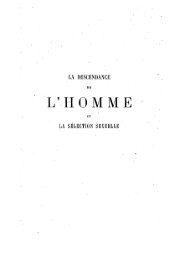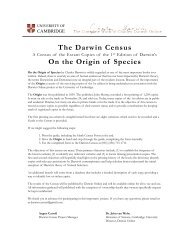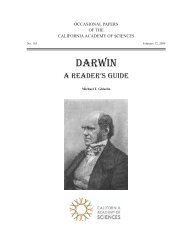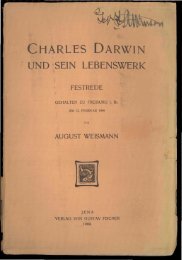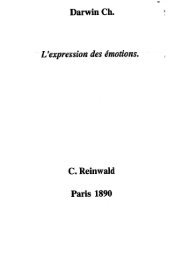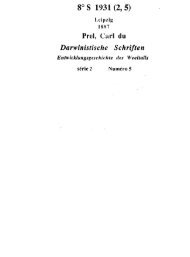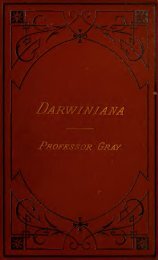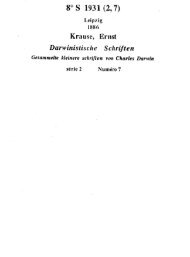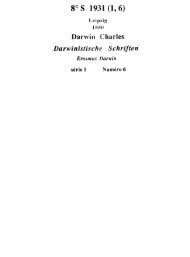Charles Darwin's Cambridge Life 1828-1831 - The Complete Work ...
Charles Darwin's Cambridge Life 1828-1831 - The Complete Work ...
Charles Darwin's Cambridge Life 1828-1831 - The Complete Work ...
Create successful ePaper yourself
Turn your PDF publications into a flip-book with our unique Google optimized e-Paper software.
Journal of <strong>Cambridge</strong> Studies<br />
10<br />
In April Darwin wrote to Fox “I find I get on very slowly with my cabinet, & shall be very glad of<br />
your assistance. I have only yet got to the Amarœ.—… I have been seeing a good deal lately of Prof:<br />
Henslow; I took a long walk with him the other day: I like him most exceedingly, he is so very<br />
goodnatured & agreeable”.<br />
On 3 June 1830 Darwin was recorded as leaving Christ’s at the end of Easter Term. He spent a few<br />
days in London before heading north to Shrewsbury. In August he returned to North Wales for<br />
collecting beetles and fishing followed by the usual rounds of shooting in Shropshire and<br />
Staffordshire. In September he wrote to Fox about his new horse which he hoped would make a very<br />
good hunter. Darwin took the horse with him to <strong>Cambridge</strong> when he returned to Christ’s on 7<br />
October 1830, for the start of the Michaelmas Term. He wrote to Fox “I arrived here in my most<br />
snug & comfortable rooms yesterday evening”. In November Darwin wrote to Fox that because of<br />
all the reading involved in “getting up all my subjects” he was left no time to catch or send insects.<br />
Darwin paid Henslow to act as his private tutor in mathematics. Darwin wrote to Fox that “the hour<br />
with him is the pleasantest in the whole day”. At Henslow’s botany lectures Darwin helped to<br />
arrange the specimens and materials before the lectures, and was generally considered to be<br />
Henslow’s favourite. William Allport Leighton, an old Shrewsbury school friend, recalled: “I<br />
remember that the Professor in the concluding remarks at the close of his course of lectures said he<br />
hoped his teaching had influenced many to perseverance — certainly he knew it had influenced one<br />
— no doubt he meant Darwin.” (Leighton 1886)<br />
Darwin spent the Christmas vacation of 1830 in <strong>Cambridge</strong> preparing for his final examination.<br />
Only after the voyage of the Beagle would Darwin reject Paley’s argument of design, already quite<br />
outdated by the 1830s. (Hanging in the College Old Library is the last College Paley examination<br />
paper from 1920.)<br />
IV.Darwin’s Last Terms at Christ’s<br />
Darwin’s final examination for the B.A. degree, which consisted of three days of written papers,<br />
occurred between 14-20 January <strong>1831</strong>. Darwin was a poll candidate. <strong>The</strong> poll (an abbreviation of the<br />
Greek ‘Hoi Polloi’ for the crowd) consisted of those students who took an ordinary pass degree<br />
rather than an honours degree. <strong>The</strong> examination consisted of six parts: Homer, Virgil, Euclid,<br />
arithmetic and algebra, Paley’s Evidences of Christianity and Principles of moral and political<br />
philosophy, and Locke’s An essay concerning human understanding.<br />
<strong>The</strong> papers were marked by Friday 21 January. On Saturday the 22 nd a second edition of the<br />
<strong>Cambridge</strong> Chronicle appeared which showed Darwin placed 10 out of 178 in the polls. <strong>The</strong>re were<br />
only 86 honours candidates that year. As Darwin recalled in his Autobiography, p. 59, “By<br />
answering well the examination questions in Paley, by doing Euclid well, and by not failing<br />
miserably in Classics, I gained a good place among the δτ πολλοι, or crowd of men who do not go in<br />
for honours”. However, Darwin had not resided the requisite number of terms so he could not yet be<br />
awarded his degree. His final two terms at Christ’s, without the pressure of preparing for<br />
examinations, were some of the most important he spent in <strong>Cambridge</strong>.<br />
In February he read J. F. W. Herschel’s Preliminary discourse (<strong>1831</strong>), an authoritative and thoughtprovoking<br />
model on correct methods of scientific investigation. It was essentially a survey of the<br />
science of the day, as well as an account of the progress of scientific knowledge. Herschel’s law of<br />
continuity meant that all parts of nature and science would be interconsistent. Given the collection of<br />
enough facts, powerful general laws could be deduced. Darwin also read Alexander von Humboldt’s<br />
Personal narrative of his expedition to northern South America.



![[180] XXX. Notes on the Eflécts produced by 25720 Ancient Glaciers](https://img.yumpu.com/49145077/1/144x260/180-xxx-notes-on-the-eflects-produced-by-25720-ancient-glaciers.jpg?quality=85)
